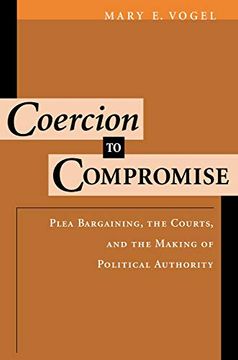Compartir
Coercion to Compromise: Plea Bargaining, the Courts, and the Making of Political Authority (Oxford Socio-Legal Studies) (en Inglés)
Mary E. Vogel (Autor)
·
Oup Usa
· Tapa Blanda
Coercion to Compromise: Plea Bargaining, the Courts, and the Making of Political Authority (Oxford Socio-Legal Studies) (en Inglés) - Mary E. Vogel
S/ 33,85
S/ 67,70
Ahorras: S/ 33,85
Elige la lista en la que quieres agregar tu producto o crea una nueva lista
✓ Producto agregado correctamente a la lista de deseos.
Ir a Mis Listas
Origen: Chile
(Costos de importación incluídos en el precio)
Se enviará desde nuestra bodega entre el
Jueves 30 de Mayo y el
Miércoles 05 de Junio.
Lo recibirás en cualquier lugar de Perú entre 2 y 5 días hábiles luego del envío.
Reseña del libro "Coercion to Compromise: Plea Bargaining, the Courts, and the Making of Political Authority (Oxford Socio-Legal Studies) (en Inglés)"
Plea bargaining is one of the most striking features of American courts. The vast majority of criminal convictions today are produced through bargained pleas. Where does the practice come from? Whose interests does it serve? Often plea bargaining is imagined as a corruption of the court during the post-World War II years, paradoxically rewarding those who appear guilty rather than those claiming innocence. Yet, as Mary Vogel argues in this pathbreaking history, plea bargaining's roots are deeper and more distinctly American than is commonly supposed.During the Age of Jackson, amidst crime and violence wrought by social change, the courts stepped forward as agents of the state to promote the social order. Plea bargaining arose during the 1830s and 1840s as part of this process of political stabilization and an effort to legitimate institutions of self-rule--accomplishments that were vital to Whig efforts to restore order and reconsolidate their political power. To this end, the tradition of episodic leniency from British common law was recrafted into a new cultural form--plea bargaining--that drew conflicts into the courts while maintaining elite discretion over sentencing policy.In its reliance on the mechanism of leniency, the courts were attempting a sort of social "triage"--sorting those who could be reclaimed as industrious and productive citizens from marginals and transients. The "worthy" often paid fines and were returned to their community under the watchful eyes of their intercessors and that most powerful web of social control, that of everyday life.Created during a period of social mobility, plea bargaining presumed that those with much to lose through conviction would embrace individual reform. Today, when many defendants who come before the court have much less in the way of prospects to lose, leniency may be more likely to be regarded with cynicism, as an act of weakness by the state, and plea bargaining may grow more problematic.
- 0% (0)
- 0% (0)
- 0% (0)
- 0% (0)
- 0% (0)
Todos los libros de nuestro catálogo son Originales.
El libro está escrito en Inglés.
La encuadernación de esta edición es Tapa Blanda.
✓ Producto agregado correctamente al carro, Ir a Pagar.

